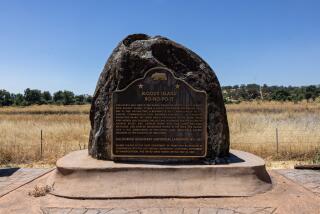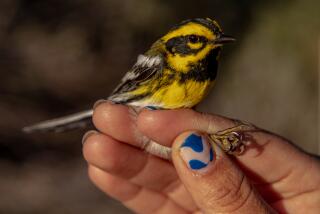In God We Trust, meet Trout America
- Share via
Steve Kreuscher says he is tired of attacks on religion in America.
So he decided to take a stand. This month, he will go to court to change his name to “In God We Trust.”
“The phrase ‘In God We Trust’ is like an endangered species, like the bald eagle,” said Kreuscher, 57, a school bus driver and artist from Zion, Ill. “By changing my name to In God We Trust, it is like I am taking one last bald eagle, for myself and for my family, and securing it as a permanent part of our heritage.”
Kreuscher has joined a growing list of people who are changing their names, some of them to unusual phrases, in an effort to make a statement. Celebrities have long changed their names, often to enhance or alter their images.
In 1993, performer Prince changed his name to a symbol (he later changed it back). Earlier this year, 15-year-old singer Miley Ray Cyrus officially dropped her birth name, Destiny Hope.
Over the last decade, more and more ordinary people have done the same.
Robert Rion of Mundelein, Ill., changed his name to Santa Claus in 1997 after decades of playing the role. Claus, who died in 2003, also looked the part, wearing a long white beard and weighing 300 pounds.
Chris Garnett, a youth outreach worker for People for the Ethical Treatment of Animals, changed his name to Kentucky Fried Cruelty.com in 2005 to protest alleged mistreatment of chickens by the fast-food chain.
A Missouri man, Andrew Wilson, changed his name to They.
Terri Iligan of Tennessee auctioned her name on EBay. A casino paid her $15,199 to change it to GoldenPalace.com.
Brian Liu, founder of LegalZoom.com, a popular online legal site, said his company had seen a 32% increase in name changes this year compared with 2007.
Women outnumber men, 60% to 40%, he said, and the largest age group is 21 to 35.
A recent trend, he said, has been people opting for simpler names.
“It has a to do with a lot of Eastern Europeans and Slavic names that are sometimes very long and difficult to pronounce,” said Liu, whose firm prepares the paperwork for the petitioner to file in court.
“But the main reason is, ‘My proposed name fits me better.’ People don’t really need a good reason. It is one of the great things about America. We allow people to be who they want to be. If they want to start life over with a new name, they can do that.”
In most states, the filing fee runs from $150 to $350 to petition a court to approve a name change.
The petition likely will be denied if fraud is suspected or if a person is trying to adopt the name of a famous person or a name that is considered offensive.
Fourteen years ago, at the age of 17, Peter Eastman, who grew up in Carpinteria, decided to change his name to Trout Fishing in America. He was influenced by the Richard Brautigan novel of the same name. But Trout had a more personal reason for changing his name.
For years, he said, he and his family had worked on restoring an old boat, which he wanted to name Trout Fishing in America. After years of work, they discovered dry rot in the wooden keel, so they abandoned the project. But he refused to abandon the name.
“I was being flippant as a teenager and decided it would be interesting to graduate as Trout Fishing in America in memory of the boat,” said Trout, now 31. “The school, of course, did not like it. But my parents were OK with it. So I used money my father gave me as a graduation present to pay the $182 court fees.”
Trout America, the shortened version he now uses, said he had no regrets. He graduated from college and recently returned from Japan, where he spent three years teaching English. The name would have caused more difficulty, he said, had he decided to enter the corporate world.
“Usually when people meet me, they say, ‘Well, that’s pretty interesting,’ ” he said. “But for me, the name change is about being able to choose. The important thing is not the name itself, but as I go through life, just being aware that I have a choice in whatever I want to do.”
Novelist Anne Bernays, who co-wrote the book “The Language of Names: What We Call Ourselves and Why It Matters,” said names often became a part of one’s self-image.
“The personality, the sense of identity and the name are so interlinked that it’s spooky,” Bernays said. “Unless you choose your own name, it does not tell me who you are, it tells me a great deal about who your parents are.”
Changing one’s name, she said, gives you the freedom to be the kind of person you would like to be and makes you feel better about yourself.
Sometimes, she said, it is about getting attention.
“They want to say, ‘I’m not like Tom, Dick or Harry or Ann or Jane,’ ” Bernays said. “It’s partly put-on and partly ‘I want to be noticed.’ ”
Growing up in the 1950s during a strong anti-communist period of history was not easy for a kid with the last name Kreuscher.
“For the first 12 years of his life, almost everyone in the whole city of Zion, where I was born and raised, called me, my brother and my sister ‘Khrushchev,’ the Soviet Union leader who at the time was threatening to bury all of us Americans with nuclear bombs,” he said.
Kreuscher said his faith helped him make it through difficult times. So by changing his name to In God We Trust, he is showing the world how he feels about his Christian faith and his love for his country.
“I see the day coming when we won’t see ‘God’ on anything, and that worries me,” Kreuscher said. “Some people are going to go to the store and buy a new TV with their [federal] rebate check. I chose to do this with mine.”
More to Read
Sign up for Essential California
The most important California stories and recommendations in your inbox every morning.
You may occasionally receive promotional content from the Los Angeles Times.












